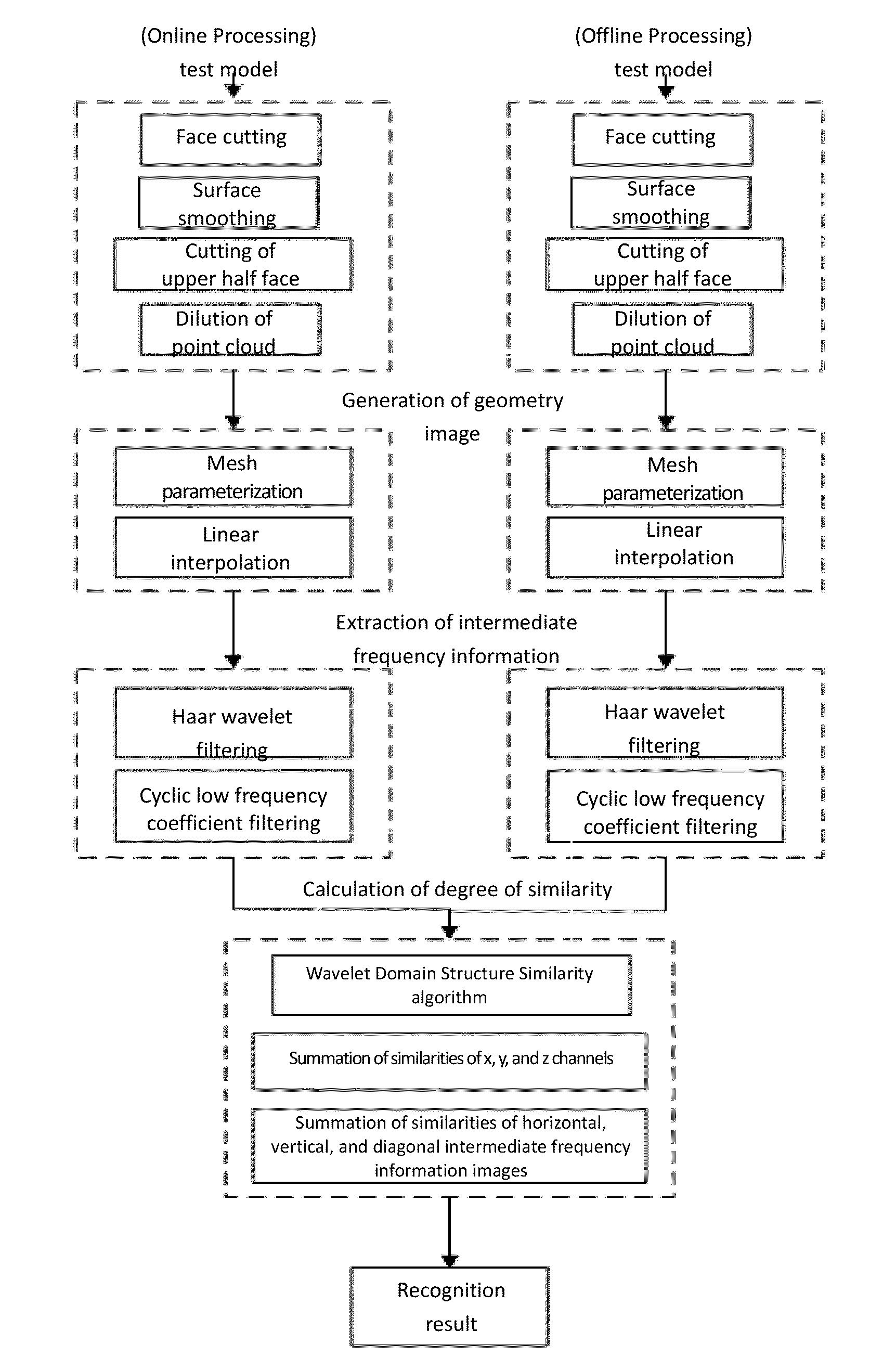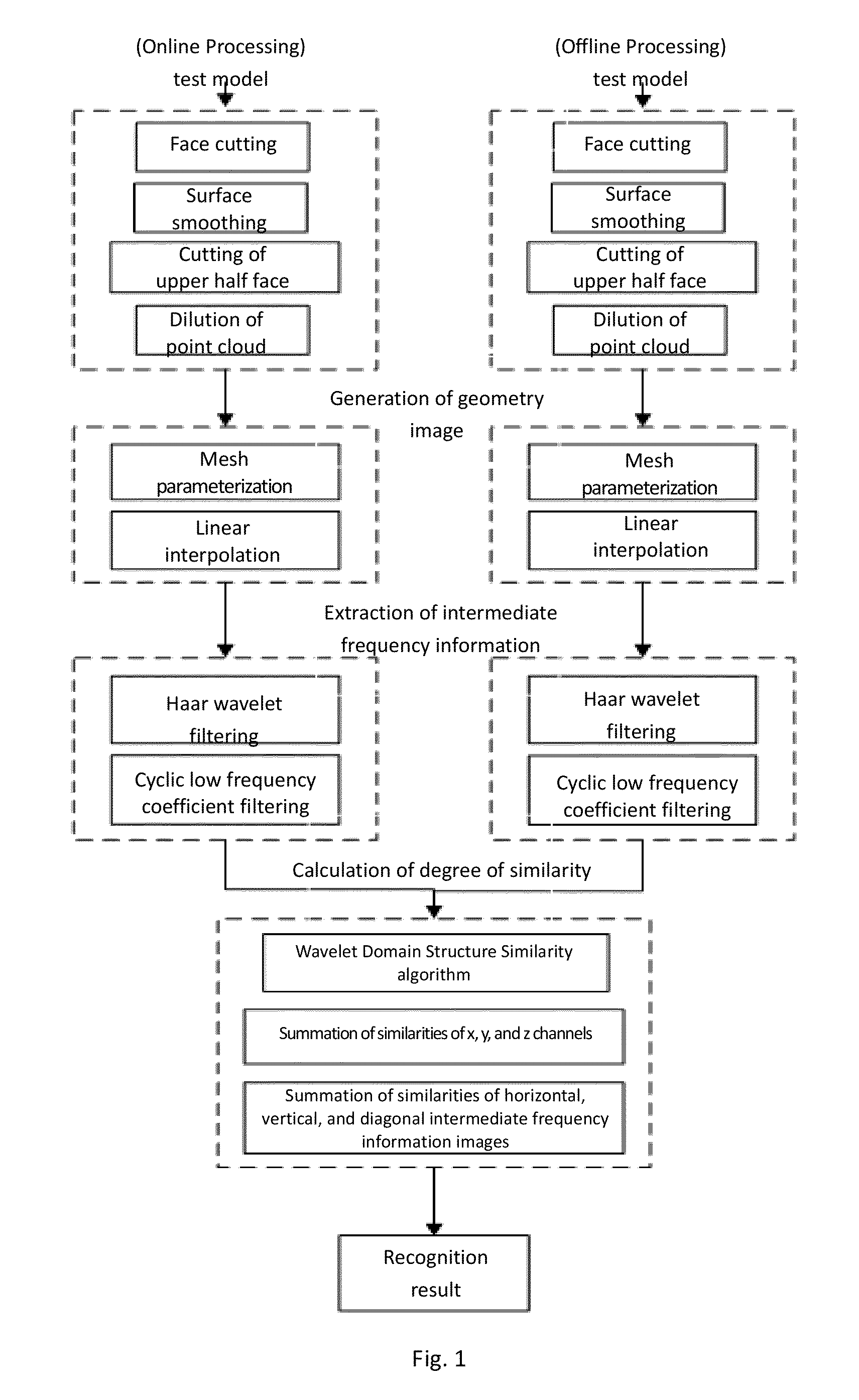Conventional
photo image based face recognition technology is restricted by factors such as illumination, posture, and make-up, etc.
However, a three-dimensional face model involves high data volume, more interference regions, and high computational complexity; in addition, the non-rigid
distortion resulted from
facial expression may cause degraded performance of a geometric information based three-dimensional face recognition method.
Therefore, how to decrease computational complexity and mitigate the
impact of
facial expression is a
bottleneck in the three-dimensional face recognition technology as well as a key challenge in the research.
1) The facial
point cloud is diluted. Usually, the denser a
point cloud is, the more the information contained in the point cloud will be, but the longer the
processing time will be. For long, a trade-off has to be made for that reason. However, when a geometric image is generated, mesh parameterization and linear interpolation
algorithm will not loss a great deal of useful information even though the point cloud is diluted. On the contrary, if no
dilution is carried out, to obtain a geometric image of three-dimensional face model, the computation load will increase geometrically, bringing severe
impact on the recognition efficiency and real-time performance.
2) Three-dimensional facial shape information is converted to the
frequency domain, and intermediate frequency information images are extracted as expression invariant features. In the present invention, facial information is converted to the
frequency domain by means of a multi-scale
Haar wavelet filter, and the information in
frequency domain is resolved to non-overlapping frequency bands, wherein the information in low-
frequency band corresponds to overall facial information, the information in intermediate
frequency band corresponds to detail facial information, and the information in high-
frequency band corresponds to
noise information. Owing to the fact that the detail facial information has higher identity discriminability and expression invariability, sub-images that contain intermediate frequency information are extracted as three-dimensional face recognition features in the present invention, and the sub-images are referred to as intermediate frequency information images. In addition, with the multi-scale Haar
wavelet filter, horizontal, vertical and
diagonal intermediate frequency information images can be generated, wherein the horizontal intermediate frequency information image reflects marginal facial information in horizontal direction, and characterizes horizontal facial features such as eyes and mouth; the vertical intermediate frequency information image contains marginal facial information in vertical direction, and characterizes vertical facial features such as
nose etc.; the
diagonal intermediate frequency information image contains marginal facial information in diagonal direction. The horizontal, vertical and diagonal intermediate frequency information images are used together as three-dimensional expression invariant features, so that three-dimensional detail facial information are fully captured and represented, and this detail facial information has strong expression robustness.
3) The
degree of similarity is calculated with
wavelet domain structure similarity
algorithm. The wavelet domain structure similarity algorithm is extended and improved from the conventional
structural similarity algorithm in wavelet domain. It inherits the advantages of structure similarity algorithm and is more suitable for calculation of the
degree of similarity of intermediate frequency information images in wavelet domain. The structure similarity algorithm quantitatively calculates the structural information difference between images to be matched in the same way as the human
visual system percepts images. In the present invention, the structural similarities of horizontal, vertical, and diagonal intermediate frequency information images between the test model and the
library model are calculated in wavelet domain respectively, and the identity of the tested face is judged according to the
total degree of similarity of the intermediate frequency information images. Since the local features in different areas of a face contain rich detail information, when the degree of similarity between the test model and the
library model is calculated, the degree of similarity in
local structure between the pixels in the intermediate frequency information images of the test model and the corresponding pixels in corresponding intermediate frequency information images of the
library model is calculated in the present invention, and finally the average local similarity is taken as the degree of similarity between the intermediate frequency information images. Compared to the conventional error-based similarity algorithm, the wavelet domain structure similarity algorithm used in the present invention can provide a recognition result that is consistent with the perceptual
habit of human
visual system, and improves the recognition accuracy of the three-dimensional face
recognition system to some degree.
 Login to View More
Login to View More  Login to View More
Login to View More 


